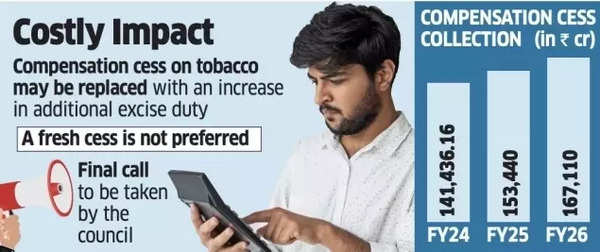[ad_1]
India may explore increasing the goods and service tax (GST) on tobacco products, including cigarettes, after it stops levying the compensation cess on them.
Tobacco products, including cigarettes and pan masala, contribute substantially to government tax collections, with revenue reaching ₹72,788 crore during 2022-23.
Currently, tobacco products are subject to 28% GST along with cess and additional levies, amounting to 53% total indirect tax. A proposal under consideration involves elevating GST to 40%, the maximum allowable rate, plus an additional excise duty, according to an ET report.
The objective is to maintain tax revenue from these products after the compensation cess ends on March 31, 2026. Officials indicate that introducing another cess to replace the compensation cess is not preferred.

Tax on cigarettes, tobacco products
A GST Council-appointed ministerial group tasked with examining the post-2026 compensation cess scenario will analyse these proposals. Officials note that cess is not considered an efficient taxation method.
These sin goods presently attract compensation cess, basic excise duty, National Calamity Contingent Duty, and 28% GST.
The current combined taxation of 53% remains significantly lower than the World Health Organization’s recommended rate of 75%.
Officials indicated to the financial daily that whilst replacing compensation cess with a health cess is being considered, several states and the central government are hesitant about introducing a new cess structure.
Also Read | More tax relief coming? After income tax slab changes in Budget 2025, Modi government eyes GST revamp
Currently, a 5% compensation cess applies to products like cigars and cigarettes, with additional specific levies ranging from ₹2,076 to ₹4,170 per thousand units, based on their characteristics such as length, filter presence and flavouring.
A group of ministers (GoM) focusing on tobacco taxation was established under former Odisha finance minister Niranjan Pujari’s leadership through the GST Council.
The GoM recommended modifying the GST cess component, suggesting it should correlate with a product’s maximum retail price instead of its sales value.
This matter was subsequently directed to a fitment committee and the GoM responsible for rate rationalisation.
Additionally, the council requested the GoM on compensation cess to evaluate tobacco taxation considering two possibilities: incorporating the cess into the existing slab or implementing an alternative cess system.
[ad_2]
Source link



